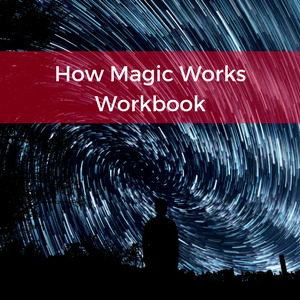I discuss how to create a personal cosmological system of magic and what the benefits of creating such a system are, as well as how it can transform your overall approach to magical work. I share an example of a system I’m currently refining and developing and the medium I’m using to represent the cosmological system.
Grimoire Ulani is now available
 Ten years ago, Storm Constantine published Grimoire Kaimana, a book that described the pop culture system of magic Dehara, based on her Wraeththu series. Grimoire Kaimana describes the basic concepts of the Dehara system and it helped create an active system of pop culture magic that is practiced by fans of the series. I was one of the people Storm collaborated with when putting together Grimoire Kaimana and I continued to do my own work in the Dehara system.
Ten years ago, Storm Constantine published Grimoire Kaimana, a book that described the pop culture system of magic Dehara, based on her Wraeththu series. Grimoire Kaimana describes the basic concepts of the Dehara system and it helped create an active system of pop culture magic that is practiced by fans of the series. I was one of the people Storm collaborated with when putting together Grimoire Kaimana and I continued to do my own work in the Dehara system.
Earlier this year, Storm asked me if I'd helped her develop the sequel to Kaimana. It had been ten years since it came out and we both had continued working in the system. We decided to put together our notes as well as collaborate together once again to put the sequel together: Grimoire Ulani.
Grimoire Ulani is available in Paperback and in a limited edition hardback.
Grimoire Dehara: Ulani is the second volume concerning the pop culture magic system based on the mythos of Storm Constantine’s popular fantasy novels, the Wraeththu series. The focus of the system is the Dehara, androgynous deities that represent the alchemical rebis, the conjunction of male and female, spirit and matter.
Following on from Grimoire Dehara: Kaimana, this book explores Ulani, the second tier of the system, incorporating the levels Acantha, Pyralis and Algoma. The practitioner now accesses deeper realms of magical knowledge, utilising their creativity and imagination as a vehicle to study the self.
The book is fully illustrated by artist Ruby, with additional illustrations by Storm Constantine.
Grimoire Dehara: Ulani includes:
Working within etheric realms
Sikaara – the deharan version of the energy system of the body and the study of its centres
Xephelax – the deharan Underworld
The dehara of alchemy and alchemical transformation
The Constellati – beings of the cosmos
Divozenky – the mind of the earth
Creating a Spiritual Pearl
This book is an essential addition to the library of any experimental practitioners of magic interested in new systems, as well as fans of Storm’s work, who want to know more about the magic described in the novels.
Would you like to be my patron?
 Would you like to become my patron?
Would you like to become my patron?
I've set up an account on Patreon, a website that has revived the model of the artistic patron. The artistic patron is someone who supports the creative efforts of artists, writers, and other creatives, and fortunately you don't need to be rich to support your favorite author or artist. You can donate a dollar a month or more to the artists and authors you want to support.
My patreon account enables you to send me a fixed amount of money each month, to support my writing, art, and magical experimentation. Best of you get something in return, beyond the satisfaction of supporting my efforts to continue being creative. Here's what you get:
- A weekly update on my progress on different projects, as well as sneak peeks at blog posts, and excerpts of my future books.
- An opportunity to get a painting from yours truly. I've rarely painted for other people, but I'm starting to do more paintings and would love to share them with you.
- Advanced access to longer essays.
- Advanced access to fiction that I've started writing.
- Special thank you for when monthly goals are reached.
All of this is only available to my patrons.
Through your patronage, I am better able to pay my monthly bills as well as put funds aside for research , experimentation, and travel to conferences so that I can present. You also help me put more time aside to write my books. It's another way you can show your support for my creative work.
Want to be my patron? Click on the link to get started.
The Book of Good Practices is now available in Print!
 My latest Book, The Book of Good Practices, co-written with Bill Whitcomb is now available in print!
My latest Book, The Book of Good Practices, co-written with Bill Whitcomb is now available in print!
This book is a master toolkit containing the world's most effective ways to increase personal empowerment, freedom, and happiness! Learn how to practice core human skills that affect every aspect of your life, such as: Creating Well-formed Goals Decision-Making Cultivating Emotional Balance and Happiness Relaxation and Stress Reduction Pain Management Communicating Effectively Establishing Rapport with Others Improving Memory Increasing Concentration and Mindfulness Boosting Creativity and Imagination Growing Empathy and Compassion …and much, much more! This is a book about how to do things. We have tried to make it as difficult as possible for you to reject the material in this book out of prejudice against one tradition or another. If we have been successful, you will see that the only way truly to evaluate the practices in this book is to try them for yourself. The Book of Good Practices provides you the means and methods to transform your life. By using these techniques, you can determine what you want to change, and then create a plan of action to enable that change.
Other Places you can find me on the web
Did you know you can find me on some other places on the web? For instance I have an authors facebook page. If you haven't liked it, please consider liking it and if you feel comfortable doing it, please share it with your friends as well.
I'm also on Twitter and if you follow me, chances are good I'll follow you back.
I also have a guest blog on Pagansquare, where I post the occasional article which doesn't end up on here.
And I'm restarting my Radio show with a co-host, Erik Roth. Our first show will be on September 19th and I'll actually be interviewing him about Shamanic Astrology.
I also have a website focused on business, so if you own a business stop by and visit it for articles.
A Magical Life now available
My newest book, a Magical Life has just been published by Immanion Press. A Magical Life is the collected blog posts of this website from 2008 to 2010, which comes out to roughly 250 pages (pretty amazing, eh?). In this book I candidly share my life journey as a magician, demonstrating that magic isn't just something you do, but something you live. You'll read about various experiments, some successful, some not, as well as the intensive personal work that I've been engaged in during those years. A Magical Life is a snapshot of the life of a magician, my mistakes and successes, and my on-going work to know myself better, so that I can become a better person. It is also an exploration of magic that shows how magic shows up in the life of a magician.
I'm pretty pleased to be putting this out, because while it is essentially a journal collection there are a lot of ideas and experiments I worked on in this pages, including some I'd forgotten about. If you wish to order a copy, go here.
Why Immanion Press is so Important to me
 I don't write much about the work I do with Immanion Press on this blog. Indeed, as far as many of you know, I'm just one of its authors. But the truth is I'm not just an author of Immanion Press. I'm also the Managing Non-Fiction editor of Immanion Press. (Cue in the jokes about being a Hair club for men member). For me, Immanion Press is one of the vehicles by which I express my passion for writing and publishing and magic in the world.
I don't write much about the work I do with Immanion Press on this blog. Indeed, as far as many of you know, I'm just one of its authors. But the truth is I'm not just an author of Immanion Press. I'm also the Managing Non-Fiction editor of Immanion Press. (Cue in the jokes about being a Hair club for men member). For me, Immanion Press is one of the vehicles by which I express my passion for writing and publishing and magic in the world.
My service to Immanion Press is one of the ways I give back to the magical community and is also an offering to the magic itself. I am not paid a salary at Immanion Press. I get a small royalty for books I edit, but I don't get paid for the layout I do, or a lot of the other work I do and I am fine with that. My service to Immanion is a dedication of love to occult writing, occult authors, and to the magic itself. It is done because I want to publish books that I know will likely not see the light of day because other publishers are afraid to touch the books. It is done because I want to empower authors who have had bad experiences with other publishers, and show them that someone has their back. Indeed as I write this I reflect on an email a prospective author sent me on Thursday, telling me how validated she feels to have a publisher interested in her work who will respect her voice, who will edit the book, but not to commoditize it for the mass market. I like hearing that because to me a publisher has two clients: The Authors and the Readers. Too often, imo, most publishers focus on the latter and forget or neglect the former.
Way back in 2003, I had written Pop Culture Magick. I shopped the book to Weiser, New Falcon, and a couple other publishers. In some cases I didn't hear back from the publishers and in other cases, I got a rejection letter. I was told that my book was too niche and controversial. I was told that I shouldn't try to publish it because it wouldn't sell. So during a trip to England, I talked with Storm Constantine, owner of Immanion Press, and to this day a good friend of mine. I showed her my book and even though Immanion Press had originally been intended for Science Fiction and Fantasy books, she saw the potential in my book and agreed to publish it. In 2004, Pop Culture Magick was published and thus we started the non-fiction line of Immanion Press. It strikes me as ironic that NOW bigger publishers want to publish books on pop culture magic. I guess it's no longer so controversial, but in 2003, a decade ago, no one would touch my book. I doubt I'll ever really get the recognition I think is deserved for paving the way, but I know I paved the way. Not just with my books either, but with other books by other authors as well. Of course, I didn't do it alone.
I had help over the years from the authors, from Storm, from Kat, and from other people and I am thankful to all of them to this day, because the nonfiction line for Immanion Press couldn't be what it is without the authors, editors, and volunteers who've offered time, blood, and sweat to make things happen. Immanion Press has always been a team effort, and so really it's that all of us paved the way to one extent or another.
A couple of months after Pop Culture Magic was published, Nick Farrell emailed me and asked if Immanion Press would consider publishing his book Gathering the Magic. It's a book about magical group dynamics and big surprise, none of the bigger publishers wanted to publish it. So I asked Storm about it, and Immanion Press took it on. I was still just an author then, but as more authors found out about us, and discovered that we wanted to publish intermediate to advanced books on magic that were for niche markets and that no book was too controversial for us, Storm asked me if I would be willing to be the managing non-fiction editor. She respected my expertise as an occultist, and the way that I knew the market. I said yes and I began what has been and continues to be one of the most important callings of my life: I publish the books other publishers won't touch because I know there is a market and that those publishers are wrong. They don't get it...how can they, when what they are focused on is really the bottom line? And I get why they are...and they have a place, and the books they publish have a place, but even so, on a certain level they just don't get it, and they never will. They aren't publishing for the same reason and what they publish is for a larger market. They aren't going to publish the controversial books, the risky books because they don't want to alienate that larger market. But the truth is that anything that is published is bound to offend someone. It's not always about hitting the largest market possible. It's about reaching the right market...the right people and meeting their needs even if it isn't an automatic hit. It's about knowing the market, knowing the people, knowing what they want...and knowing that giving it to them does involve some risk, because you can't please everyone...and maybe you shouldn't.
Working at Immanion Press hasn't always been easy. At one point I came very close to leaving, burned out, and fed up with how taken for granted I felt by everyone involved. And being a strong personality, I know I am not always easy to work with and that I've made a few mistakes along the way. But overall, I love the work I do at Immanion Press and over time the process has gotten easier. What people forget sometimes is that Immanion Press is a small press. We don't have a paid staff of editors, publicists, marketers, etc. We run on a tight budget and the people who work for us get paid in royalties. And yet they do it anyway, which I am so thankful for...because they believe in the vision of Immanion Press. They believe that what we are doing is important enough to support it. And despite not having what traditional publishers have, we make it work and we find ways to help our authors out. It's not a perfect system, far from it, and sometimes it doesn't work out as well as it could. But we make it work anyway.
And I am proud of our authors and books. I am proud that I've played a role, however small it is, in helping authors launch their writing career and when I see that one of my authors got a book published by another publisher I feel good about it, because I know that getting published by us helped with that. We publish the controversial books, and we also bring books back into print and what we have available is awesome. We've published books on the subjects that the other publishers won't touch and we've played a role in getting conversations to happen. We've also told the authors that we want them to write in their voices and that we won't sanitize those voices. At the same time, we've insisted on academic standards of in-text citation and quotations, which readers tell me they love because they see it so rarely in the majority of books published on magic and paganism.
At this last Pantheacon, two of my authors, Tony Mierzwicki and Crystal Blanton, told me in their respective ways how much they liked working with Immanion Press. Tony told me how he'd shopped his book Graeco-Egyptian Magic everywhere and was about to self-publish it when he remembered meeting me and decided to see if we'd publish his book. We said yes and he told me how getting his book published opened doors for him. He told me how much he appreciated a free marketing seminar I gave to the authors (and inspired me to start it up again for my authors). And I know that even if he never publishes another book with us, we played a role in his life and in his writing that he'll always remember. And that touched me so profoundly and I was so grateful for his appreciation and recognition of Immanion Press and my role in all of it.
And at one point I was talking with Crystal and she abruptly stopped me and said, with much emotion, "Thank you" several times. And later she told me how much she appreciated my vision for Immanion and she said that she didn't think I knew what an impact I had on her community because of how I'd supported her as an author and as an editor of The Shades of Faith Anthology we published. And she's right I didn't know it, but that weekend gave me a glimpse...and later she acknowledged at a panel my role in the anthology and how I'd recognized I wasn't the right person to edit that anthology, and that I knew I needed to find someone who could do it justice. I was so touched by what she said, so honored that she felt I had contributed to her vision and work.
And I've had other authors on occasions tell me similar things and I have always felt touched. To me that is the biggest payoff. I have helped authors reach their audience. I have respected their voices, their culture, their audience...I have done my job as a publisher and an editor and as a magician...I have believed in them and provided a platform to help them reach others who can believe in them as well.
And I've continued to write my books and place them with Immanion. I'll admit I do find it frustrating when I go to Powells books and don't see my books on the shelves or the Barnes and Nobles because we use print on demand and because we don't take returns. Yet that frustration pales to the joy I feel writing my books my way...knowing my voice will be respected, knowing that the cover of the book will be the cover I pick. And I know I'm reaching my audience. I'm reaching the people who need my work and that is what is really important.
I'm writing a book on Wealth Magic and I flirted with the idea of letting another publisher publish one of my books. I even sent a proposal in and then...I went to a panel held by the publisher and in that panel I heard everything that was an antithesis of my approach to publishing. They wanted trendy, marketable ideas. They wanted books that had cute titles and approached magic in a hip marketable manner that would hit the largest market possible. I left feeling sick to my stomach and I knew that none of my occult books will likely ever be published by a larger publisher. I simply can't imagine emasculating my vision and my words in that way just to make a buck. And I don't feel they will really get my vision or my approach or understand that I know the market better than they may know it. I know I'll write non-occult books (I'm starting one as soon as I finish the wealth magic book) and those books will go to more mainstream publishers, but my spiritual work, the work that touches the heart of the universe and speaks the language of magic...that work needs to be the way it is...not written for a general audience...not written to make a buck, but written to speak to the people who need it...written in my voice, written the way I want it to be written. And yes it means my books will always be with a small publisher. It means that I won't get some of the advantages that some of my other occult authors have. And I can live with that...because even though its a harder road to walk and there is more work on my end as an author, I've already been doing it for ten years, and I like how I feel about myself as a writer and as a magician. I don't say that to pass judgments on other authors. I recognize that many of the other occult authors have had awesome relationships with the publishers they've worked with. I just feel that for me I know where the home of my occult books are...and hopefully always will be. And that's Immanion Press. My press...my publisher and one of my loves. I love Immanion Press. I love what we stand for and I love that I serve the magic with the work I do for the press. That is more important than anything else. I serve the magic.
Answers to Questions of the Week 1-10-13
 Each week I ask people to share with me questions they have about magic. I then answer those questions in my blog. The first question that was asked was: Have you ever practice some Draconian magic? Can you recommend any book on the subject?
Each week I ask people to share with me questions they have about magic. I then answer those questions in my blog. The first question that was asked was: Have you ever practice some Draconian magic? Can you recommend any book on the subject?
I asked for some clarification on this practice and the person mentioned that's she'd done Draconian magic through the Order of Apep. I'll admit I've never heard of that order. I would say the closest I've come to doing Draconian Magic involves a weekly offering I make to the spirit of the Dragon. Every few weeks I also do a full invocation of Dragon, which is part of the offering. I feel a close connect to draconic energy, perhaps due to the fact that I was born in the year of the Dragon according to Eastern Astrology. I can't recommend any books on the matter.
Are psychedelics a legitimate tool? was the second question. I'll point the person to my post from last week, which sums up my thoughts on psychodelics.
Are runes still good to use as sigils or for creating sigils or should I use a different alphabet character or self created sigil for use? was the next question.
You can use runes for sigils, though I think one disadvantage is that you are already dealing with cultural and spiritual meanings associated with the runes. However you could change how the runes appear or combine them and create a new symbol altogether. I sometimes takes letters from the English alphabet and connect them to each other and the resultant symbol works.
Do you think enochian magic is "real" or just someone else's godforms?
I think its real enough for the people who practice it. I've done a bit of research into it, but I see it as just another system of ceremonial magic, complete with a set of entities to interact with.
What do you think of psychology and, other mind sciences, being applied to magic?
I'm of a mixed mind about it. I think there is value to applying psychology to magic, as well as any other mind sciences, but I also think there's a tendency, thanks in large part to Crowley and chaos magic, to write off magic as just being a psychological phenomenon, or "All in your head" as some people like to put it. I've had too many experiences to write magic off as a purely psychological experience and I think that portraying magic as just a psychological phenomenon dilutes the value of a spiritual experience and closes the person's mind to other possibilities.
I do apply psychological concepts to magical work and I've found it useful to do so, but my application is less about trying to describe magic as it relates to psychology and more about integrating psychological techniques to make my magical work more effective.
Self-secret language and patterns of reality
 In Darwin's Pharmacy, the author points out the following: "I want to suggest that trip reports are fundamentally scripts, what I have called elsewhere rhetorical software: linguistic, visual, musical, and narrative sequences whose function resides less in their "meaning" than in their capacity to be repeated and help generate patterns of response. They are part of the psychonautic apparatus and not a supplement to it. They are compositions that suggest, but do not exhaust what one may very well become in contact with entheogens."
There are three things that interest me about this quote. One of those things is the concept of self-secret language, which I've written about before. Self-secret language is the discourse of a given community and it is language that is only understood when you've had enough experiences that allow you to understand the various terminology being used, and enables you to contribute to the community you are seeking entrance to.
In Darwin's Pharmacy, the author points out the following: "I want to suggest that trip reports are fundamentally scripts, what I have called elsewhere rhetorical software: linguistic, visual, musical, and narrative sequences whose function resides less in their "meaning" than in their capacity to be repeated and help generate patterns of response. They are part of the psychonautic apparatus and not a supplement to it. They are compositions that suggest, but do not exhaust what one may very well become in contact with entheogens."
There are three things that interest me about this quote. One of those things is the concept of self-secret language, which I've written about before. Self-secret language is the discourse of a given community and it is language that is only understood when you've had enough experiences that allow you to understand the various terminology being used, and enables you to contribute to the community you are seeking entrance to.
What stands out to me about the quote above is that another function of self-secret language and its various artifacts is that people do need to be able to repeat them and use them to generate responses. You see this in academia, where mastering the academic language is an initiation in its own right, with the expectation being that you'll be able to successfully replicate the language and use it to generate your own responses to other artifacts in the academic field you are in. Self-secret language, when used in this way, protects the discourse from the uninitiated, while also qualifying who is initiated. The downside of such an approach is that it can also cause stagnation. This is one of the reasons academia tends to be conservative in its approach. It's also why you see a similar conservative approach in a lot of occult traditions. The traditions are preserved and the uninitiated are kept out, but the tradition progresses slowly and views potential changes as a threat, and responds accordingly.
The second thing which interests me about the quote is the concept of generating patterns of response. I've explained that above, in terms of self-secret language, but lets consider as well that a pattern of response also leads to a pattern of reality. The response is the confirmation of a discourse, but it is also what is used to discover patterns of reality that support the discourse and may even be used to generate those patterns of reality. A pattern of response sets up an expectation for what will be manifested as reality and trains the people involved to look for that reality and/or manifest it through their own actions.
There is also an ontological element that interests me about the quote, specifically the use of the word become, which is an ontological shift from one state of being to another...in this case in reference to entheogens, but it can also be applied to magical work, or really any kind of work that involves some kind of identity shift. I'd argue that self-secret language, i.e. discourse is an example of an identity shift. A person must adopt the discourse of a given discipline, and that adoption includes a fundamental change in identity, a becoming of something new through the mastery of the discourse.
And what do I really mean by all the above...It's an example of self-secret language in and of itself, a discourse analysis provided by my own experiences in academia and tempered by my interests in ontological shifts and magical work.
A New Testimonial for the Process of Magic
 Round Three of the Process of Magic class starts on October 31st. You'll get 24 lessons on the process of magic, one mailed out each week, as well as a free pdf of Creating Magical Entities. Magic is a process. Regardless of what magical type of magical working you do, you are using a process to shape and define reality as well as yourself. In this 24 lesson class, we will explore what the process of magic is and how it applies to your magical work. The end result will be a dynamic reshaping of your magical practice into a personalized system that you will be able to use to consistently generate results for the betterment of your life.
Round Three of the Process of Magic class starts on October 31st. You'll get 24 lessons on the process of magic, one mailed out each week, as well as a free pdf of Creating Magical Entities. Magic is a process. Regardless of what magical type of magical working you do, you are using a process to shape and define reality as well as yourself. In this 24 lesson class, we will explore what the process of magic is and how it applies to your magical work. The end result will be a dynamic reshaping of your magical practice into a personalized system that you will be able to use to consistently generate results for the betterment of your life.
Below is a Testimonial from one of the students in round Two of the course
I decided to take Taylor Ellwood's Process of Magic class after many years of magical practice and study as a way to reboot my work. I've been involved with a few traditions but have generally been very eclectic in my approach. In my view eclecticism is a strength if you can find a way to synthesize all of those disparate takes on the magical path. Taylor has stripped away most of the window dressings associated with magic. Instead of focusing on style and aesthetics he focuses on the roots of practice and the processes underlying them. For those who are already involved in magic but are wondering how to weave together the rich variety of strands available to us in the 21st century, examining the processes that underly all magic, no matter the flavor, is an excellent place to start. For newcomers and beginners this course will help you quickly move beyond the 101 stage and help you start getting your hands dirty with practical magic. -Justin Patrick Moore
If you want more information about the process of magic class or you want to sign up for the course contact me.
Some Thoughts on Timing and Magic
 The most recent lesson from the strategic sorcery discusses timing and magic. It's focus on timing has more to do with the time of day or planetary cycle or moon cycle than how I approach timing. I've never found traditional timing in magic to be all that relevant or necessary to magical work. When people say to wait for a waning or waxing moon to do a type of magic, I say do it regardless of when the moon is waxing or waning. If you're doing it right, it should work anyway. When someone says to wait for a specific day or time of day to do a type of magic I say that they are over thinking it and that if you're doing it right, it ought to work without having to factor those kinds of conditions. I look at that kind of timing as a window dressing of magic. In other words, its not essential to performing successful magic.
The most recent lesson from the strategic sorcery discusses timing and magic. It's focus on timing has more to do with the time of day or planetary cycle or moon cycle than how I approach timing. I've never found traditional timing in magic to be all that relevant or necessary to magical work. When people say to wait for a waning or waxing moon to do a type of magic, I say do it regardless of when the moon is waxing or waning. If you're doing it right, it should work anyway. When someone says to wait for a specific day or time of day to do a type of magic I say that they are over thinking it and that if you're doing it right, it ought to work without having to factor those kinds of conditions. I look at that kind of timing as a window dressing of magic. In other words, its not essential to performing successful magic.
Now I get that this traditional kind of timing has been used for a long time in magical work and that some magicians can arguably point to how using such timing has helped them pull off some successful magic, because they've been able to harness sympathetic energy/forces to enhance the momentum of their magical work. It might even be argued that doing magical work at the wrong time of day increases resistance to the realization of that work. I just don't buy it as a principle of magic and the reason is that I've never found that not adhering to traditional timing to be a bad thing or to stop the effectiveness of my magical work. It seems at best to be an optional aspect of magic, and at worst to be a holdover of more traditional perspectives that obscure the underlying principles of magic. The question boils down to this: Can you consistently get a result regardless of when you do a magical working? If the answer is yes, then is this kind of timing necessary to magical work.
Now when I think of timing and magic, I think of how to time it just right so that the result comes when you need it. Timing for me is more about working with time as a whole, specifically in terms of getting things to happen at just the right time and place. I want a result to occur at a specific moment of time or when a specific condition is fulfilled. That kind of timing is precises, oriented on the understanding that the alignment of specific circumstances calls for specific responses to keep everything running smoothly. Timing as it applies to events and to opportunity is what interests me, because its opportunity which is important to magic. Opportunity defines magic to the extent that in the application of practical magic we are looking for specific opportunities. Timing plays a role in the achievement of those opportunities because for an opportunity to become more than potential you need to be at the right space and time. So when I do practical work, I always factor in timing and space. When and where do I need an opportunity to occur so that I can capitalize on it. Think about that in your own magical work and you'll find it to be very relevant to the manifestation of possibility into reality.
Round 3 of the Process of Magic Course
 Round 3 of the Process of Magic Class is starting on October 31st, just in time for Samhain! If you've been looking for a way to take your magical practice to the next level or to make some changes to your life, this class is for you:
Round 3 of the Process of Magic Class is starting on October 31st, just in time for Samhain! If you've been looking for a way to take your magical practice to the next level or to make some changes to your life, this class is for you:
I'm really enjoying your class. Especially helpful was how you showed the Tarot as offering up possibilities instead of viewing the cards in a rigid way. I'm also working with the element of Earth for a year. What I'm really finding from your class is that magic works. You can't believe how many doors have started opening up for me that were right under my nose. - T. Vorster
This is a 24 lesson class, with lessons mailed everyday Wednesday. The cost of the class is $80. Magic is a process. Regardless of what magical type of magical working you do, you are using a process to shape and define reality as well as yourself.
The outline of the course is as follows (though I may be adding a lesson or two to this cycle):
Lesson 1: An overview of the process of magic
Lesson 2: You and Definitions of Magic
Lesson 3: Results, Change, and their respective roles in magic
Lesson 4: The anatomy of the process of magic
Lesson 5: Culture, Ethics and Ideology
Lesson 6: What isn't essential to the process of magic
Lesson 7: Connection and its role in the magical process
Lesson 8: Intention, Attention, and Magic
Lesson 9: Inhibitory Actions and Magic
Lesson 10: Excitatory Actions and Magic
Lesson 11: Internal Work
Lesson 12: Spiritual allies and the magical process
Lesson 13: Invocation 1
Lesson 14: Invocation 2
Lesson 15: Evocation 1
Lesson 16: Evocation 2
Lesson 17: Divination
Lesson 18: Enchantment
Lesson 19: Astral Projection
Lesson 20: Banishing
Lesson 21: Attunement with the land
Lesson 22: The Role of Limitation in the Process of Magic
Lesson 23: The role of Transformation in the Process of Magic
Lesson 24: The role of Mundane actions in the Process of Magic
Contact me to get more information and to sign up for the course.
The realities of religious persecution
 Recently Jason from the Wild Hunt posted some articles about religious persecution which is occurring toward Pagans. Go here, here, and here, to read the articles on the topics. I also read another article on how Pagans in Wyoming are mostly solitaries and are very careful about sharing their beliefs because of the fear of persecution. Folks, even in a seemingly "advanced" country as the U.S. or the European countries there is still persecution if you don't follow the religious practices of the Christian religion.
Recently Jason from the Wild Hunt posted some articles about religious persecution which is occurring toward Pagans. Go here, here, and here, to read the articles on the topics. I also read another article on how Pagans in Wyoming are mostly solitaries and are very careful about sharing their beliefs because of the fear of persecution. Folks, even in a seemingly "advanced" country as the U.S. or the European countries there is still persecution if you don't follow the religious practices of the Christian religion.
We can tell ourselves that surely by now people will learn to tolerate each others' beliefs, but its not that simple. The reality of religious persecution is that it is another form of privilege. When a person from a majority religion says they are being persecuted in a place where that majority religion is accepted and tolerated (as some of the religious right like to believe) they are simply deluding themselves. After all they don't have to worry about losing a job because of their beliefs, nor do they have to be careful about the jewelry they wear in public or for that matter they don't have to worry if they bring up their religion at a meeting that isn't about religion. Nor do they have to worry about having their books burned or being threatened by people simply because of what they believe, at least in the countries where they are the majority religion.
Pagans aren't the only people discriminated against and some religious beliefs have it worse, but it doesn't change the fact that if you are pagan there is a level of persecution that can occur just because you choose to have those beliefs. when you need to hide your beliefs because you are afraid of other how other people will react, and in particular are afraid you will be harmed, that is persecution.
We can hope for a world where people will tolerate each other's beliefs, but to do that we need to really pay attention to how we represent ourselves publicly. Thus, as mentioned in the one article, where the parent got upset and called local authorities, the best way to handle it was to stick to the higher ground. But sticking to the higher ground also must involve raising awareness of these very issues and showing that there are problems that need to be addressed not merely by the community being persecuted, but also by the community doing the persecuting.
Some further Thoughts on Shielding
 Recently Mike made a post on his blog mentioning my post on shields, and there was some interesting commentary that occurred as a result about whether shields were really effective or not. Several people argued that while shielding protected you it also didn't allow you to interact with the world as effectively. Ananeal argued that:
Recently Mike made a post on his blog mentioning my post on shields, and there was some interesting commentary that occurred as a result about whether shields were really effective or not. Several people argued that while shielding protected you it also didn't allow you to interact with the world as effectively. Ananeal argued that:
Working shielded makes your magick less effective in terms of influencing material events. Even if you put up a shield that’s perfectly permeable to your own magical workings, which takes some skill, it still takes some of your energy/power/strength/whatever you want to call it just to maintain the shield.
He then proceeded to mention that he'd developed specific entities to take care of magical protection and that he also did a daily regimen of practices. The points that he and the other commenters made were valid ones, but I've never had any of the troubles with shielding that they suggest occur.
Like Ananael I do a daily practice. It consists of Tumo the raising of psychic heat, which I generally use to "wake up" my internal energy, and a combination of Taoist Water Breathing used to dissolve any internal blockages and the Zeroing technique that William Gray writes about in Magical Ritual Methods. There is a derivation of that technique developed by R. J. Stewart called the Sphere of Art. The zeroing technique involves creating a space of Zero Time, Zero Space, and Zero Event, essentially a space/time where nothing exists save the practitioner AND what the practitioner chooses to bring into that space/time. I use this technique with my magical work in general and it can, for all intents and purposes be considered a "shielding" technique.
Now when this technique is used it does serve to create a very specific space/time that excludes anything not brought into it by the practitioner. However the beauty of it is that you can bring into it exactly what you need to work with, be it an entity, possibility or something else. Additionally, what is also significant is that when you wrap up the magical working, and return that space/time to regular space/time, you merge it with and embody it into reality, making a seamless transition where there is no resistance to the possibility being manifested. That problem mentioned in the comments about not connecting to the world or being able to effect material events? Not a problem with this technique.You draw in the event you want to affect, as well as the possibility you want to use to solve the problem, work the magic and mesh it into your own identity, and then release the zeroing space/time, or sphere of art and allow yourself and the magic to fully reintegrate into the world around you, embodying a new reality in the process.
Back when I did shielding in other ways, I also had my shields set up so that I didn't have to maintain them. I let the influences, people, etc that were trying to interfere do the maintaining for me. Always worked like a charm and can be used with wards as well, when shielding a place. The shields only activate when something directs energy that would be harmful or distracting to the magician. And those shields are fed by the very energy, influence, etc being directed against them. Simple, effective, no draining of your energy required.
And my point in mentioning all this is simply that if you know what you're doing, a given act such as shielding shouldn't have any of the problems that the people mentioned in the comments. Defining a technique by its limitations means you accept those limitations and don't question them. While you should know what the limitations of a given technique are, define it in terms of what it could do and then experiment! Don't settle for explanations offered by others about the limitations and problems of a given technique. There's always a way to solve the problem or limitation of a given technique if you are willing to experiment. I only encountered those problems when I first started practicing magic and when I encountered them, I got curious and decided to see what I could to fine tune my shields and avoid the issues they mentioned in the comments. It took a bit of a work, but its nothing that anyone couldn't discover, provided they are curious enough and willing to experiment with a given technique. Why settle for allowing a technique to limit you? My answer: Don't settle...experiment.
Is initiation required to do a practice?
 In the Six Yogas of Naropa, the editor mentions that to do the six yogas it was considered essential to get initiation from a living lineage master, and that this belief is held to this day by the people who practice the six yogas. Reading that got me to thinking about initiation in general and also the fact that although I practice specific Tibetan techniques I have never been initiated into a lineage. I don't even know anyone in person who practices these techniques and I'll admit that I have practiced the techniques based on how I have interpreted the reading I've done, which means my own practice may not be accurate the actual practices (though it still seems to be effective and to generate the results that are supposed to occur).
In the Six Yogas of Naropa, the editor mentions that to do the six yogas it was considered essential to get initiation from a living lineage master, and that this belief is held to this day by the people who practice the six yogas. Reading that got me to thinking about initiation in general and also the fact that although I practice specific Tibetan techniques I have never been initiated into a lineage. I don't even know anyone in person who practices these techniques and I'll admit that I have practiced the techniques based on how I have interpreted the reading I've done, which means my own practice may not be accurate the actual practices (though it still seems to be effective and to generate the results that are supposed to occur).
Still I'm faced with a quandary. I can read this book and take the textual materials and translate them into practices, while accepting that I have not been initiated into a specific lineage, or I can find a way to travel to Tibet or somewhere else and get initiated. Knowing myself as I do, I'll more than likely read the text and do the practices, and not be concerned that I have or haven't been initiated into a lineage. What matters to me is the actual practice, and yet in a real sense I am missing out on that actual practice.
I'd argue that what I'd end up practicing might be similar to the six yogas, but it won't actually be the six yogas, because there will be something missing from the practice. What will be missing is the spiritual context that the initiation provides. I may be able to accurately do each practice and get results that are congruent that one would normally get, and yet nonetheless there will be something missing.
The main point of initiation, in a spiritual working, is that it provides you access to spiritual context, entities, etc. That access confers on you a specific kind of knowledge, a self-secret language, that provides connection with others in a similar way. And it also provides a layer of social access that is denied to just anyone. By being initiated you become part of a social order and culture that is part of the spiritual context.
On the other hand, beyond when I was given Reiki Attunements, I've never been initiated into any magical practice or order. I've taught myself. I've read books, practiced what was written and then modified it to fit my approach to the world. And while I'll admit that I may not have the spiritual context for practices that others might have, I've also created my own context and found that it has worked very well for me.
I see the value of initiation as a spiritual practice, but I'm not sure its essential for being able to do a specific practice. What I think is really essential is the willingness of the practitioner to engage the practices and incorporate them into his/her life. I've begun doing that with the six yogas and already noticed a change in my Tumo workings. What else can be asked beyond the sincere desire to engage the practice as best one can and meaningfully implement in one's life? For me that is the true initiation and it is experienced everyday.
A new testimonial for the Process of Magic Class
 One of my students taking the Process of Magic Class shared the following testimonial:
One of my students taking the Process of Magic Class shared the following testimonial:
I'm really enjoying your class. Especially helpful was how you showed the Tarot as offering up possibilities instead of viewing the cards in a rigid way. I'm also working with the element of Earth for a year. What I'm really finding from your class is that magic works. You can't believe how many doors have started opening up for me that were right under my nose. - T
It really pleases me to get this kind of feedback for the course. I'm planning to create a weekend intensive for people who wish to learn in person from me, but this testimonial verifies that the class is adding meaning to the practices of the people taking it.
If you are interested in exploring your magical practice from a process perspective, contact me. I'd love to answer any questions you have and get you started.
Elemental Fire Balancing Ritual Month 11
 8-22-12 It amazes me how people duck out of being responsible for their actions. I say this statement with an awareness that I have sometimes been one of those people. The level of honesty it takes to be truly responsible for your actions and their consequences is high and can be hard to live with. It is much easier to blame others or to paint your actions in a lesser light, without really acknowledging how you contributed to the situation. I think it is rarely, if at all, ever one person's responsibility for a given situation. Yet it is far easier to paint a person in that light instead of taking your part of the responsibility for the situation or problem that has occurred. The best way to work through this issue is to do internal work and really examine your actions and understand what motivated and then be honest about it with yourself and anyone else affected by the situation. This doesn't mean you beat yourself up, but rather that you can acknowledge your level of responsibility and then discuss what happened with an eye toward resolving it.
8-22-12 It amazes me how people duck out of being responsible for their actions. I say this statement with an awareness that I have sometimes been one of those people. The level of honesty it takes to be truly responsible for your actions and their consequences is high and can be hard to live with. It is much easier to blame others or to paint your actions in a lesser light, without really acknowledging how you contributed to the situation. I think it is rarely, if at all, ever one person's responsibility for a given situation. Yet it is far easier to paint a person in that light instead of taking your part of the responsibility for the situation or problem that has occurred. The best way to work through this issue is to do internal work and really examine your actions and understand what motivated and then be honest about it with yourself and anyone else affected by the situation. This doesn't mean you beat yourself up, but rather that you can acknowledge your level of responsibility and then discuss what happened with an eye toward resolving it.
8-23-12 If you don't like the direction your life is going in or the people you spend time with, or the situations you put yourself in, then it is your responsibility to change that direction, change who you spend time with, and/or change the situations you find yourself in. You have control over your choices, and if you claim you don't, you are choosing to be a victim.
9-5-12 I think of myself sometimes as a chameleon or changeling. I change to fit the circumstances or fit the person to some degree. It could be that this true of all people, but I'm not sure if it really is true. I know it is for me in the sense that what I am into or interested in is shaped to some degree by the person I am with. In one sense it creates a plastic kind of identity, something that is molded. Certainly I see this occurring in the changes in my lifestyle and choices based on my current circumstances and it causes me to feel some degree of wonder at the adaptability a person can have if s/he chooses to.
9-7-12 Attitude is the internal fire of a person. If the attitude is negative, the fire burns low, becoming embers that could be snuffed out any moment. If it is positive it can blaze you'd never believe, shining so bright, a light to draw the eyes and attention of others.
9-9-12 Sometimes being involved with someone and dealing with their issues doesn't mean that you need to learn some cosmic issue or see it as a message from the universe trying to teach you something. Sometimes a person is just not a good fit for you and vice versa and sticking with the relationship is a mistake that causes more pain for all involved. I figure when you are with the right person/people, you'll know because even when there is effort involved, it will be something all are fully committed to working through, because they'll know the resulting harmony is worth it.
9-17-12 I've just gotten back from my annual trip up to the Esoteric Book convention. There's a lot to write, so bear with me...I stayed at this place in Milton, called Camp Edgewood, a Spiritualist camp sight, and there was definitely a distinct energy, a kind of cocoon about the place which was helpful to me.
The book convention itself, was as always an amazing event. I got to meet Greg Kaminsky in person (the occult of Personality podcaster) as well as Clint Marsh, and several other people, as well as see familiar faces. I also ended up adding a few books to my collection, including two books on alchemy, a neurotransmitter book, one on hermetics, and one that was actually gifted to me called Divine Healing Hands. Its particularly notable for two reasons. One it was a reminder by my spiritual allies to continue working with the Taoist, Tantric, and Tibetan skills I'm learning (This is important in context to another event that occurred this weekend) and secondly it's notable because the person who gave it to me clearly recognized that I was doing Taoist internal work and mentioned that it might be helpful and that he expected nothing in return. I was deeply honored as its not every day someone gives me a book, so it's on the reading pile as well (along with so many more).
Saturday night, I finally got to meet R. J. Stewart in person, as well as Anastacia Nutt. They both know my wife, as she does spiritual work with them, and as readers of my blog know, I've been reading R. J.'s books and writing my own observations, so I was greatly looking forward to meeting him. We had dinner with them and it was interesting. I felt this instant exchange of energy, a kind of spiritual transmission between the four of us, as well as a rapport that I normally don't feel with most people (and even when I do feel it, it takes a while to establish). Perhaps it helped that we had a lineage of sorts in common, i.e. his work with William Gray and my work with Gray's material, but I felt it was more than that. We talked magic, publishing, current events etc., and throughout I felt a strong sense of connection and community. R.J. gave us his latest book, which is about Ronald Heaver. I'd planned to give him a copy of Magical Identity, but we'd forgotten it when we left the conference on Saturday so they told us to drop it off on Sunday.
After we packed up at the conference, we headed over to drop the book off. We thought it'd be a quick knock on the door and then drop the book off, but when we got there, we were invited in. I gave them the book and we chatted a bit. My wife asked if she could visit the sanctuary and they said sure, and then asked me if I'd like to. I said yes. Later my wife told me that they don't let people outside their magical order into the sanctuary and that their invitation to do so was deeply significant. I agreed. I went into the sanctuary. Silent, still meditation. I did Taoist water breathing, and let myself feel the energy. Very clean, pure energy, A permanent sphere of art. I felt my spiritual allies connect with me and tell me that I needed to work with R.J. and Anastacia directly. I walked out and told them that I wanted to learn directly from them.
Now I want to pause my narrative and point out I've only ever had two mentors for my magical practice and both disappointed me. I learned early on that I was better off teaching myself and going my way instead of letting someone try and dictate how I should practice magic. For me to want to learn from someone directly, to really learn from them and work with them is very rare. It's a level of trust I rarely give out. But my spiritual guides and really my connection with them, and the sense of a magical lineage...lets just say it's the counter point to my Eastern studies, the continuation of my western studies with people I know will provide some interesting direction and challenge for me. Plus I feel that R. J. and Anastacia has an open approach to magic, open enough for me and that's what matters, so basically I asked them to be my mentors, and I plan to go to their workshops and learn from them. And again I felt a spiritual transmission occurring on Sunday, a sharing of energy, a connection that went really deep. My wife was surprised, both by my desire to learn from them (and consequently engage in the same spiritual work she's involved in) and in the fact they'd invited me to the sanctuary and really invited me into their lives. To be honest, I was surprised to and honored as well, but there is something there. My spiritual allies wouldn't have spoken up if there wasn't. More than that, he's the one person I can actually meet in the flesh who worked with Gray face to face, and in that sense the opportunity also allows me to continue work in that vein. I have no idea where this will take me, but I am excited and I feel changed. As we drove my wife said my energy felt softer, like something hard in me had cracked...and I agree with that. For me to really ask someone to teach me, to work with me as a mentor...that's unprecedented. I feel touched on a deep level. I am glad I am taking step, not only as a way to better know my wife and what and who she values, but also for my own spiritual and magical evolution.
The influence of Cut-up on my magical work
 Reading over some of the bibliographic articles in thee Psychick Bible reminded me of my own history with the cut-up technique that William S. Burroughs and Brion Gysin developed. In the spring of 1998, I had the fortune to take an English literature class that focused on the works of William S. Burroughs. The professor was one of those rare academics who was willing to take risks and offer something different from the standard fare you'd typically find in colleges. That course introduced me to William S. Burroughs and his writings, and changed my life. In Burroughs, especially his later works, I found an author I could identify with. Throughout his works were allusions to esotericism, and how to incorporate magic into writing, and how writing could shape space and time...and of course the cut-up technique. Ironically, I took the course because I wasn't sure what else to take, but taking it challenged me to look at writing and literature in a different way than I ever had, and it was ideal for a young occultist that was just beginning to explore magic from an experimental perspective.
Reading over some of the bibliographic articles in thee Psychick Bible reminded me of my own history with the cut-up technique that William S. Burroughs and Brion Gysin developed. In the spring of 1998, I had the fortune to take an English literature class that focused on the works of William S. Burroughs. The professor was one of those rare academics who was willing to take risks and offer something different from the standard fare you'd typically find in colleges. That course introduced me to William S. Burroughs and his writings, and changed my life. In Burroughs, especially his later works, I found an author I could identify with. Throughout his works were allusions to esotericism, and how to incorporate magic into writing, and how writing could shape space and time...and of course the cut-up technique. Ironically, I took the course because I wasn't sure what else to take, but taking it challenged me to look at writing and literature in a different way than I ever had, and it was ideal for a young occultist that was just beginning to explore magic from an experimental perspective.
When I think of the cut-up technique, I think of cutting up magazines and newspapers and my own writing and then gluing it altogether in my room, and later taking it and transcribing it to some story I was writing, while listening to the spoken word of William S. Burroughs, his dry crackling voice gleefully describing alien situations, weird sex, and evil old men out to conquer death. That was my first real work with cut-up and it was something I continuously experimented with over the period of about 4 or 5 years. I still do an annual collage or two each year (you can see one of the 2012 ones in this post).
I later began experimenting with cut-up via magical work more directly, actually using the altered state of consciousness to do an automatic cut-up sigil in the style of Austin Osman Spare's sigil work. These cut-up sigils were used for a variety of purposes including the two evocations I mentioned in my recent post about magic and proof. I found this approach to be highly effect because it literally involved a rewrite of reality. First I'd cut-up the conventional reality that had already been created, and then reform it into my own collage message to the universe, complete with a reformatted space and time. The universe has always been kind enough to respond and its a technique I use to this day.
What fascinates me the most about cut-up is how it can be adapted to a wide variety of mediums outside of writing. Art, sound, and video all offer potential explorations of cut-up, some of which have already been experimented with by various people. Cut-up is a mutable technique, a mutable form, and inspires mutation in general. It's flexibility, in terms of mediums, makes it ideal as a magical technique because its not restricted to a specific way to do it.
Here's to William S. Burroughs and Brion Gysin for offering a new perspective on writing and in the process offering so much more!
Two purposes for utilizing magic
 "Magick is by one definition, if you will, the science of making things happen according to your desires in order to maximize control over one's life and immediate environment to create a universe that is perfecting in its kindness to you" - Genesis P-orridge
"Magick is by one definition, if you will, the science of making things happen according to your desires in order to maximize control over one's life and immediate environment to create a universe that is perfecting in its kindness to you" - Genesis P-orridge
The definition I've used above is a good one for describing one of the purposes that magic is used for. Indeed its fair to say that its descriptive of how most magicians approach magic. But it's not the only purpose. What should be clear however is that magic is a process of turning possibilities into reality, when this kind of definition is used. This kind of definition focuses on thaumaturgical or practical magic. The purpose of this kind of magic is to create practical solutions for a person's life, or to create a universe that is perfecting in its kindness towards you. How this occurs is through turning possibilities into reality, but to do that, there also needs to be an awareness as to how likely a possibility could become reality. The more likely a possibility can become reality, the easier it is to manifest that possibility through magic. The more unlikely, the more energy required. Thus one of the reasons the wise magician marries mundane efforts to magical efforts to realize a practical goal. For example, if you want to use magic to find a job, you still have to go out and fill out applications, submit resumes, and get interviewed. The magic doesn't work in the absence of those activities. It enhances those activities and more specifically the favorable and desired outcome that results due to doing those activities. It's stacking the odds in your favor. If you don't do the mundane activities, it becomes harder to manifest the desired possibility. Many people, when realizing that magic works this way, seem surprised because they have believed in magic as a kind of wave of the wand and everything appears. The reality is that magic is a process that interfaces with other processes. When you utilize magic you are accessing possibilities and discovering what it will take not only magically, but alos mundanely to make it all happen.
Turning possibility into reality involves clearly understanding what the desired result is, as well as understanding how it will apply to your life. In my previous post I mentioned that many people take a reactive approach to utilizing practical magic, which means they'll employ it when they need to solve a problem. The proactive approach involves utilizing magic to make your life easier, but this also means doing a fair amount of internal work to understand and work with your issues. I think its fair to say that there will always be some reactive use to magic, but if a magician can make the practical work be more proactive, s/he will find it much easier to manifest and keep desired results.
There is also theurgical magic, magic done for spiritual work. This type of magic differs from practical magic because the focus is not on obtaining practical results, but instead is focused on spiritual communion and the evolution of the magician. Theurgical work involves the attunement of the magician to spiritual energies and forces. It can also involve doing work for your community or environment that isn't necessarily for the benefit of yourself (as occurs in practical magic), but instead is part of the mission of your theurgical work. A fair amount of theurgical work is also internal work, in the sense that the magician needs to understand him/herself well enough to not sabotage the theurgical work s/he is doing. Know thyself magician is a fundamental understanding of the necessity of self-awareness as it applies to the spiritual evolution of the magician and his/her spiritual mission.
Practical and spiritual magic can and do sometimes blend together, but in general I'd say they tend to be different focuses and paths. I'm more of a practical magician, with the majority of my work and experiments focused on obtaining results, but there is some work that is more theurgical in nature. Both purposes are equally valid forms of magical practice. Magic is less about the fantastic and much more about living life on your own terms. When you realize this, you also realize that living life on your terms is actually quite fantastic, not only in terms of joy, but also the recognition that many people do not live life on their own terms.
Book Review: The Psychick Bible by Genesis P-orridge
In this book you'll find a collection of TOPY essays including the Grey Book and other materials not previously published publicly, as well several previously published essays that are fascinating in terms of the biographical information provided, and also a one-sided perspective on Genesis and TOPY's falling out. I enjoyed reading this book a lot, and found the various texts to be informative and useful as it applies to my own magical work, especially as applied to the cut-up methodology and its application to magical work. It was also fascinating to learn more about the history of TOPY, albeit through a filtered perspective. I also enjoyed the essays on pandrogeny. I consider this a historical text that any magician, particularly those in chaos magic, might want to pick up. It demonstrates as well some of the issues that can arise in any magical organization.
Two Popular Misconceptions about Magic
 "Watch with glittering eyes the whole world around you, because the greatest secrets are always hidden in the most unlikely places. Those who don't believe in magic will never find it." -Roald Dahl, 1990
"Watch with glittering eyes the whole world around you, because the greatest secrets are always hidden in the most unlikely places. Those who don't believe in magic will never find it." -Roald Dahl, 1990
There are two popular misconceptions about the practice of magic that occur, which can hinder useful inquiry and understanding of magical work. One popular misconception is special effects magic, the type seen on TV shows, video games, and movies, comics, and fantasy books. For example, Darth Vader using telekinesis to crush the throat of someone, or a sorcerer changing into a serpent or throwing a fireball, etc. The second misconception is a belief that magic will solve all your problems, or as I call it the cure all approach. These popular misconceptions can obsfucate what genuine magical work is about, and typically are sought after because a person desires a sense of power in his/her life.
Special effects magic looks impressive. Who wouldn't find it thrilling to throw a fireball or change their physical shape, or do something else equally impressive? I've yet to meet a magician who can perform special effects magic (without using special effects). If there were such people, I suspect the world would be a different place, though I can't help wondering how such power wouldn't be abused or worse end up like a comic book formula of endless battles and trite commentary. There's also the principle of limitation to consider, specifically the understanding that force needs to be limited in order for form to be realized. In magical work, the achievement of form occurs when force is limited. Additionally, it is understood that when you work with magical energies you can only raise so much of that energy before you hit a limit, and/or have that limit imposed by the forces you are working with. Thus throwing a fireball, which would require a lot of force is not something that will be easily performed. In fact, when you account for the amount of energy needed to generate a fire ball, plus the amount of protection needed by the practitioner while handling said fireball, what you end up realizing is that it's not a very practical working. And if you mess it up, you'll either internally combust or burn your hands or do something else equally messy. The same applies to shape shifting and telekinetically handling objects or crushing people's throats. The physical demands, plus the amount of energy that needs to be raised to perform either feat is not something that is physically or magically possible. Special effects magic looks impressive and thrills lots of people, but a practical approach to magic acknowledges that the main focus of magic isn't to necessarily generate such physical demonstrations and also notes that such demonstrations may end up being more of a waste of energy than anything else.
Then we have the cure all misconception, which focuses on the idea that magic will solve all your problems. The sad fact is that while magic can be used to solve problems, most times its used in that way, it is done so as a reaction and usually what is solved the symptom, but not the underlying issues that need to be examined by the magician. A proactive approach to utilizing magic to solve problems generally involves a fair amount of internal work and a willingness to own your dysfunctions and make changes that resolve those issues, with the understanding that such changes will also improve your life, and surprisingly enough decrease the number of times magic is needed to solve a problem.
There's also the fact that sometimes magic complicates issues more than it cures or resolves them. It shouldn't be surprising that many magicians end up complicating their lives when using magic to solve a problem. The problem might be solved, but not in the way they expected, and it may bring out underlying issues that need to be addressed (thus the need for internal work). A person who believes magic will solve all their problems needs to examine the level of responsibility they are willing to take to have those problems solved, because that level of responsibility is exactly what you'll be dealing with when you utilize magic as a cure all. There is no force that can solve your problems for you, better than your own ability to take responsibility and deal with the problems head on. It can be hard work, but it is good work as well.
In my next post, I'll discuss two purposes magic is used for as well as provide some commentary on what it means when a magician turns a possibility into reality.
Book Review: A Spiritual Worker's Spell Book by Draja Mickaharic
This book, like Draja's others books, is interesting because it provides a variety of spells a person can do as well as case studies of how people have used the spells. I've already tried a couple to good effect and it'll definitely be a useful book to have, especially because I represents the work of an old school magician. My only complaint is that I'd have liked more information about the underlying magical process. Much like other authors who put together spell books, Draja doesn't really explain the underlying mechanics. the few times he does offer some explanation about the process, it proves to be quite fascinating. I highly recommend it as an interesting book on a variety of topics.


